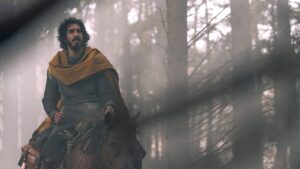Among the highlights of David Lowery’s latest film, “The Green Knight,” are the crowns. As worn by King Arthur (Sean Harris) and his queen (Kate Dickie), they come with built-in halos, which are attached to the back at ninety degrees, like the open lid of a tin can—handy for reminding your subjects that you rule by divine right. Students of Arthurian custom will also note Lowery’s take on the Round Table, which is more of a ring, with room in the middle for capering jesters, blackjack dealers, and the like. Watch this space.
“The Green Knight” is described onscreen, in suitably antiquated fonts, as “A Filmed Adaptation of the Chivalric Romance by Anonymous.” The romance in question is a long English poem, “Sir Gawain and the Green Knight,” which was most likely written in the late fourteenth century. The poet promises to tell his tale “as hit is stad and stoken / In stori stif and stronge”—or, as rendered by J. R. R. Tolkien, “as it is fixed and fettered / in story brave and bold.” If the language of the original, thorny with alliteration, has proved as tempting and as testing to modern translators—including the poets W. S. Merwin and Simon Armitage—as the challenge thrown down in Arthur’s court, how much tougher is the task of conveying, in a movie, even scraps of so distant a legend?
The Green Knight – Plotline

One option is to snap the whole thing awake. Thus, the sleeping Gawain (Dev Patel) gets a bucket of water tossed over him by his low-born lover, Essel (Alicia Vikander), whose accent wanders like a travelling minstrel. Somebody calls out to him, “You a knight yet?” “Not yet,” he says. “Better hurry up,” comes the reply. Here, we gather, is not Gawain the paragon of gallant virtues, as he is hymned in the poem, but Gawain the lad—lusty, hasty, and unsure of his noble vocation. Later, though, it is he who responds to the Green Knight’s dare; who decapitates him; who looks on as his victim calmly retrieves the head (which gives a defiant laugh) and departs; who is therefore honor-bound to embark on a quest, enduring many perils en route; and who, as the year dwindles, meets the woody stranger once again, and awaits the axe’s bite.
In short, the film is an uneasy blend of the bygone and the new. Gawain fulfills the demands of his Yuletide pledge, and, as in the poem, he takes refuge on his journey at a lonely castle, where the lord (Joel Edgerton) supplies a warm welcome and his wife (Vikander again, now with improved elocution) makes it warmer still, much to Gawain’s discomfort.

Yet what we witness in his chamber is, if anything, less carnally candid than what we read on the page—“Hir brest bare bifore, and bihinde eke”—and the bloodshed, too, is diluted. The hunting scenes on which the poet lavishes great care, sparing no detail of gutting and butchering, are nowhere to be seen.
ALASKA TSUNAMI WARNING CANCELLED; EARTHQUAKE WITH 8.0 MAGNITUDE
Yet “The Green Knight” wields a peculiar magic, the reason being that Lowery—as he showed in “A Ghost Story” (2017), which ranged with ease over centuries—is consumed by cinema’s capacity to measure and manipulate time. Observe the marvellous sequence in which Gawain, trussed up by bandits, lies on a forest floor. The camera pans around through three hundred and sixty degrees; finds him reduced to a skeleton; circles back in the opposite direction; and finally alights on him, now alive and about to break free of his bonds.

